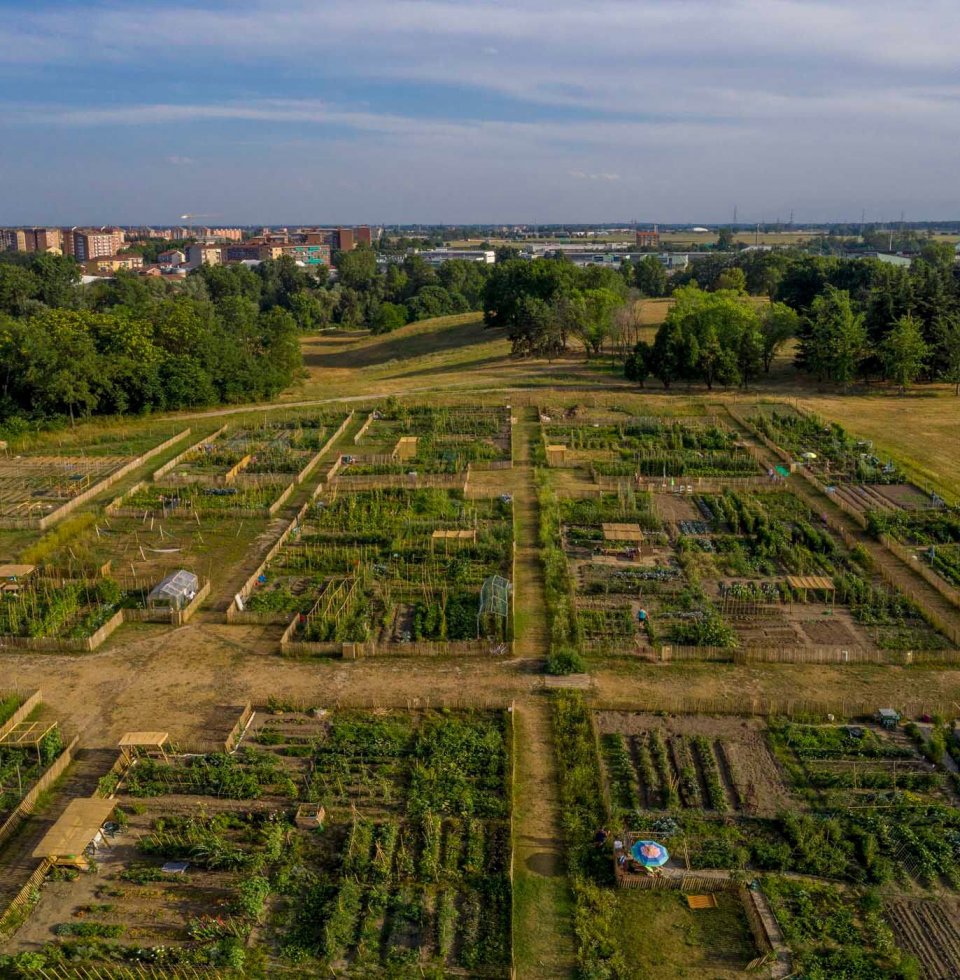
Orti Generali is located in the district of Mirafiori South, a peripheral area of Turin. The association obtained the concession of 3 hectares inside the Piemonte Park (Cascina Piemonte area). This part of the city is famous because here FIAT was born and all the area was design and developed to host its workers. Today the area suffer from post-industrial heritage such as high seniority of population, great unemployment, loss of relational fabric and it is highly characterized by a huge number of unauthorized gardens. They born during 1960s when many workers of FIAT, with agricultural background, started to cultivate into public abandoned green areas. Today this activity brings with it issues from a social and ecological point of view.
The aim of the project Orti Generali is to regenerate Cascina Piemonte area, which is mostly reduced to ruins because of occupations and acts of vandalism, creating new community gardens that will pursuit different goals: education, social inclusion, technological innovation, job training.
160 gardens of different charges and sizes have been realized and 330 trees were planted. Gardens have been assigned to private citizens, families or collectives, with lower charges for people under 35 and for economically disadvantaged people. The design of these gardens goes beyond the classic model of urban gardens. In fact, it includes an area (30% of the entire site) that is meant to be a shared green space in which people can meet and socialize. Gardeners have the opportunity to partially contribute to the maintenance activities of these common spaces (i.e. trimming fruit trees, the trees of the roads, cutting the hedges and the lawns, managing the recycling bins, taking care of ordinary maintenance). The goal is to create an educational center that uses the garden as a multidisciplinary tool that promotes the spread of urban, social and civic agriculture by building networks of relationships with public and private bodies, associations, cooperatives, groups, individual people. The setting up of an educational area with an urban farm, an apiary, a greenhouse-classroom and didactic gardens guarantees a continuous educational and training offer over time and addressed to multiple types of users.
- As a result of the participatory transformation of an abandoned public place, the relational fabric of a peripheral area of Turin has been recovered with more than 1000 associated people that periodically live the area.
- Thanks to the multidisciplinary nature of horticulture, people with social/economical difficulties, people with disabilities, students, citizens could be included in different kind of activities (educational activities, training activities, internships, volunteering, …).
- Horticulture lets the autoproduction of vegetables, giving access to safe food and reducing the CO2 emission avoiding the purchase of food that has traveled many km
- Development of an economically sustainable social enterprise based on urban agriculture
Orti Generali could be transferred in any place where there is an abandoned green area that could be recovered with the participation of the citizens to host urban agriculture activities.
Since every place has its own environmental and social characteristics, the design method could be replicated, but inevitably the final project will differ from place to place.
At least a landscape architect, a sociologist/educator and an agronomist are required for specific skills.
- The Italian bureaucracy needs long timeline and high costs to obtain authorizations and permissions.
- In a community project on a large surface it’s possible to face small thefts prolonged over time (work tools, gas cylinder, coffee, dishes, vegetables…)
Horizon 2020 programme
Fondazione Compagnia di San Paolo
Fondazione CRT
Comitato Territoriale Iren
PON Metro
